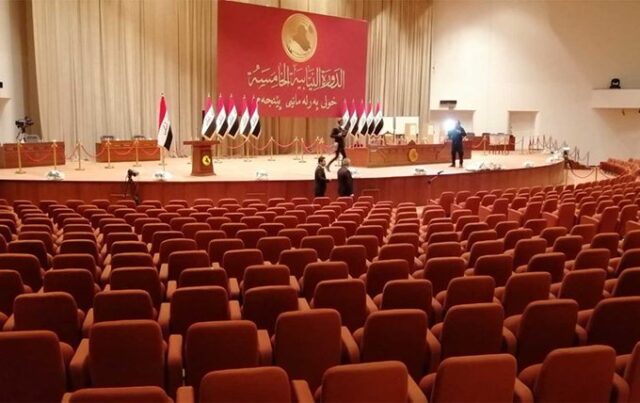Iraq’s new Parliament met for the first time yesterday. There were noisy and chaotic scenes during its first session. In its first session, the Parliament re-elected its speaker for a second term.
The meeting comes after close to three months since the October 2021 elections. Election results were challenged by Iran-backed Shia groups. However, the election was ratified by the Iraqi Supreme Court, rejecting the allegations made by the factions.
Iran-backed groups had alleged irregularities in the 10 October elections. The Federal Supreme Court rejected this claim on 27 December 2021, making way for the meeting of the Parliament.
Iran-backed armed groups had not performed well during these polls.
The next step for the Parliament would be to elect a new government, which will replace the government led by Prime Minister Mustafa al-Kadhimi.
The task for the first meeting of Parliament was to elect the Speaker and two deputies. There were chaotic scenes as no single political party won a clear majority. The next step would be to elect a Prime Minister and a President.
The October 2021 elections saw low voters’ turnout since a new political system came into place after the US-led invasion in 2003. October polls were followed by allegations of tampering with results and series of talks between different political parties to work towards forming a government.
Muqtada al-Sadr, a Shia leader, won 73 seats out of 329 seats in the Parliament. Sadr campaign was about rejection of any foreign power on Iraqi soil. The Fateh alliance, another Iran-backed group, could only win 17 seats.
While Sadr has certain advantages in forming the government, but he is likely to face challenges from other Iran-backed groups. As per the Iraqi constitution, the largest political party in the party gets to choose the prime minister.
During the 9 January meet, there was chaos as the coalition Shia Coordination Framework disputed the election results. The coalition, composed of Shia factions, claims to have the support of 88 members of Parliament, making it the largest bloc.
The MPs crowded around Mahmoud al-Mashhadani, the senior most member in the Parliament, who was leading the session. Mashhadani had to withdraw after he fell sick. When the Parliament resumed after commotion, 200 MPs selected Speaker Mohamed al-Halbousi for a second term. Halbousi’s Sunni party came second in the polls with 37 seats. He got the support of Sunni, Kurdish and al-Sadr groups.
As per followed norms, the Speaker is a Sunni, Prime Minister is a Shia and the President is a Kurd. The Parliament gets 30 days from its first session to elect the new President, who will then invite the largest bloc to form the cabinet government.









